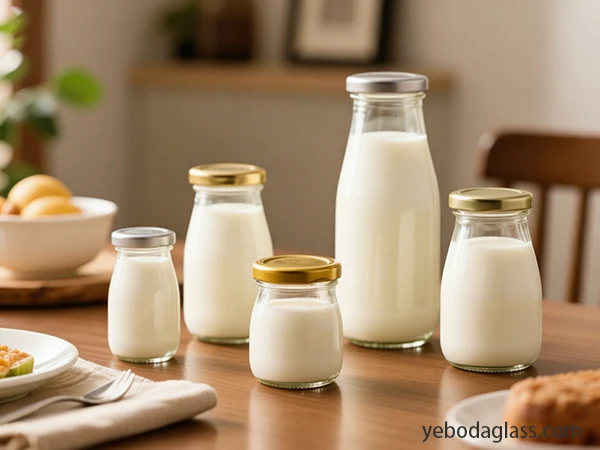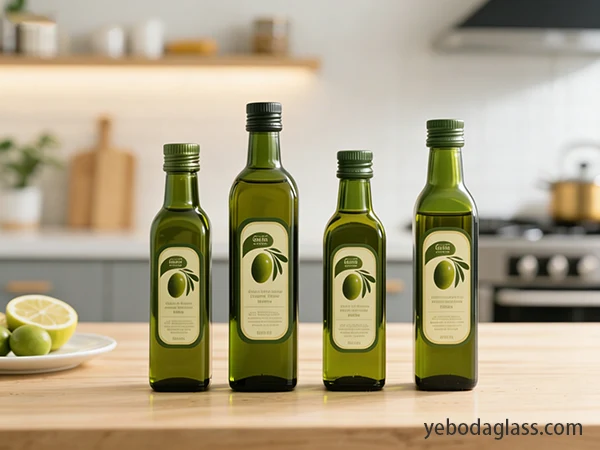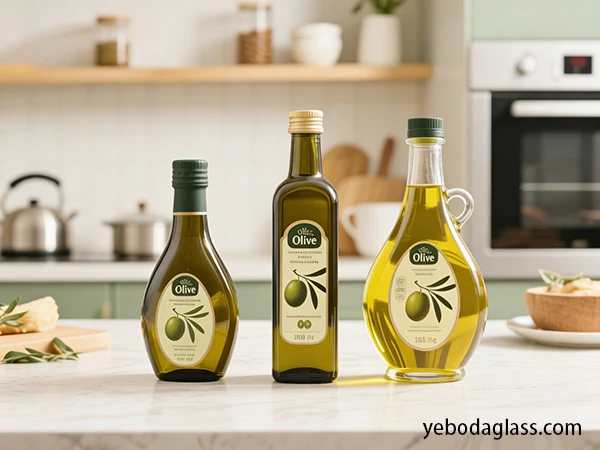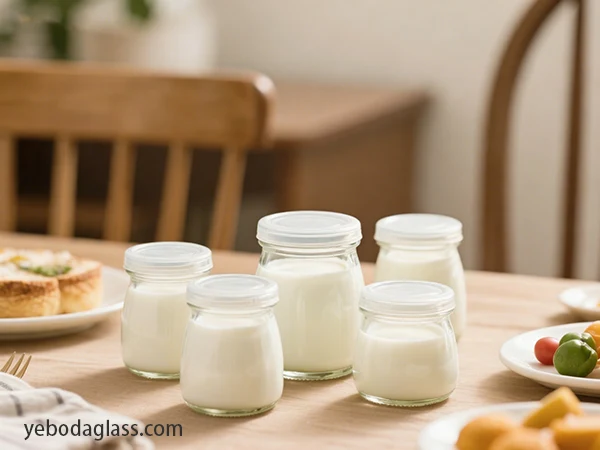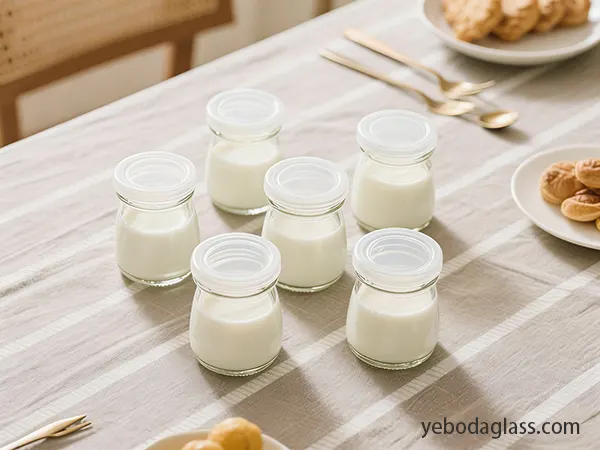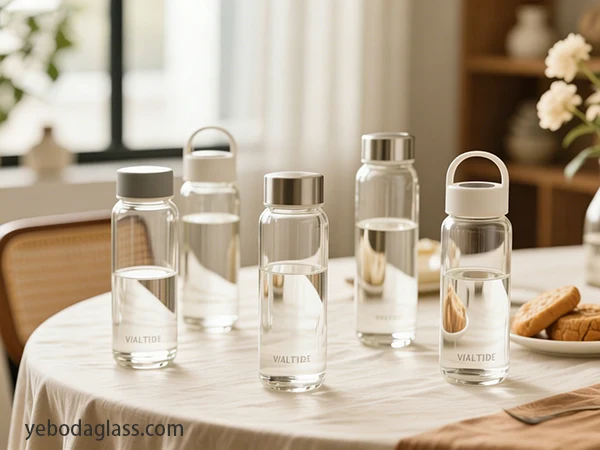Az üvegbefőttesüveg-beszállítók stratégiai kiválasztása fontos a termék integritása, a működési hatékonyság és a piaci megkülönböztetés szempontjából. Ez felvázolja a vezető partnerek értékelésének vázlatát, különös tekintettel a termékminőségre, a szabályozási követelményeknek való megfelelésre, a gyártási kapacitásra, az innovációra, a költséghatékonyságra és a partnerség mélységére. A Yeboda számára ezen szempontok megértése rugalmas ellátási láncot teremt, amely támogatja a hosszú távú fejlődést és a fogyasztói bizalmat.
1. Termékminőség és szabályozási nevelés
A termék sikere a csomagolás minőségén és biztonságán múlik. Az üvegek esetében ez szigorú anyagintegritási, gyártási szabványoknak, valamint iparági tanúsítványoknak és szabályoknak való megfelelést jelent.
1.1 Anyagintegritás és gyártási szabványok
Az üveg, egy passzív anyag az élelmiszerekkel való érintkezéshez, stabil molekulaszerkezete miatt 5 szigorú minőségellenőrzést igényel. A fejlett minőségellenőrzési módszerek elengedhetetlenek a tartósság, az átlátszóság és a szerkezeti integritás szempontjából, figyelemmel kísérve a nyersanyagok tisztaságát, az összetétel stabilitását és pontosságát. A gyártóknak a legmodernebb analitikai technikákat (pl. FTIR, DART-MS, GC-MS, HPLC, LC-MS/MS, LC-ORBTRAP™ MS) kell alkalmazniuk a termékek ellenőrzésére és vizsgálatára a termékbiztonság biztosítása érdekében. A 2023/2006-os helyes gyártási gyakorlat (GMP) rendelete is kötelező, amely megfelelő nyersanyagokat, minőségbiztosítást és nyomon követhetőséget ír elő. Ez minden gyártási lépést ellenőriz, megakadályozza a hibákat és biztosítja a stabilitást.
1.2 Szabályozási megfelelőség és tanúsítvány
Az élelmiszerrel érintkezésbe kerülő üvegek esetében a szabályozási megfelelés nem parazita jellegű. Az élelmiszerrel érintkezésbe kerülő anyagok (FCM) magukban foglalják a végső csomagolást, a nyersanyagokat és a félig késztermékeket.
1.2.1 Európai Uniós rendeletek
Az Európai Unió rendelete az 1935/2004/EK, amely előírja, hogy az élelmiszer nem lehet mérgező, nem lehet mérgező, nem változtathatja meg az élelmiszer szerkezetét, és nem befolyásolhatja az ízét/illatát. A migrációs vizsgálat fontos az élelmiszerek csomagolásból élelmiszerbe történő átviteléhez különböző körülmények között és élelmiszertípusok esetén, a migrációs vizsgálati tanúsítványban dokumentálva. Harmonikus törvények kidolgozásán dolgozunk a megfelelési költségek növelése és az üzleti akadályok elkerülése érdekében. Az üvegtárgyakat néha nem megfelelően tesztelik más élelmiszerrel érintkező anyagokra vonatkozó protokollokkal; Az importált üvegnek meg kell felelnie az Európai Unió 4. szabványának. Az „Élelmiszerbiztonságos” szimbólum (borospohár és villa) megfelelőségét jelzi. Az EFSA Európai Unió röviden bemutatja Vidhan FCM-et.
1.2.2 Az Egyesült Államok FDA-szabályozása
Az Egyesült Államokban az anyagnak szerepelnie kell a 21 CFR-ben felsorolt, GRAS-ként elismert anyagnak, amely TOR-mentességre jogosít, vagy jóváhagyott FCN1-nek, amely biztosítja az élelmiszerrel való érintkezés biztonságát.
1.2.3 Egyéb tanúsítványok és szabványok
A beszállítóknak a vonatkozó tanúsítványokat, például az ISO-t (pl. ISO 9001, ISO 14001) is meg kell őrizniük, és bizonyos termékek esetében gyermekbiztos csomagolást kell biztosítaniuk. A kiterjedt dokumentáció és a szigorú minőségirányítási rendszer a megbízhatóságot jelzi.
1.3 Magyarázatmentes címek és címek
A nem szállítással kapcsolatos kockázatok súlyosak, az import elutasításától a visszahívásig (pl. 507 EU RASF értesítés az FCMS-re vonatkozóan, 2012-2017 1). Az aktív beszállítók szigorú belső eljárásokkal, folyamatos monitoringgal, audittal és egyértelmű korrekciós intézkedési tervekkel rendelkeznek. A Yeboda olyan beszállítókat vár el, akik bizonyítottan megfelelnek a követelményeknek, és átlátható minőségbiztosítással rendelkeznek.
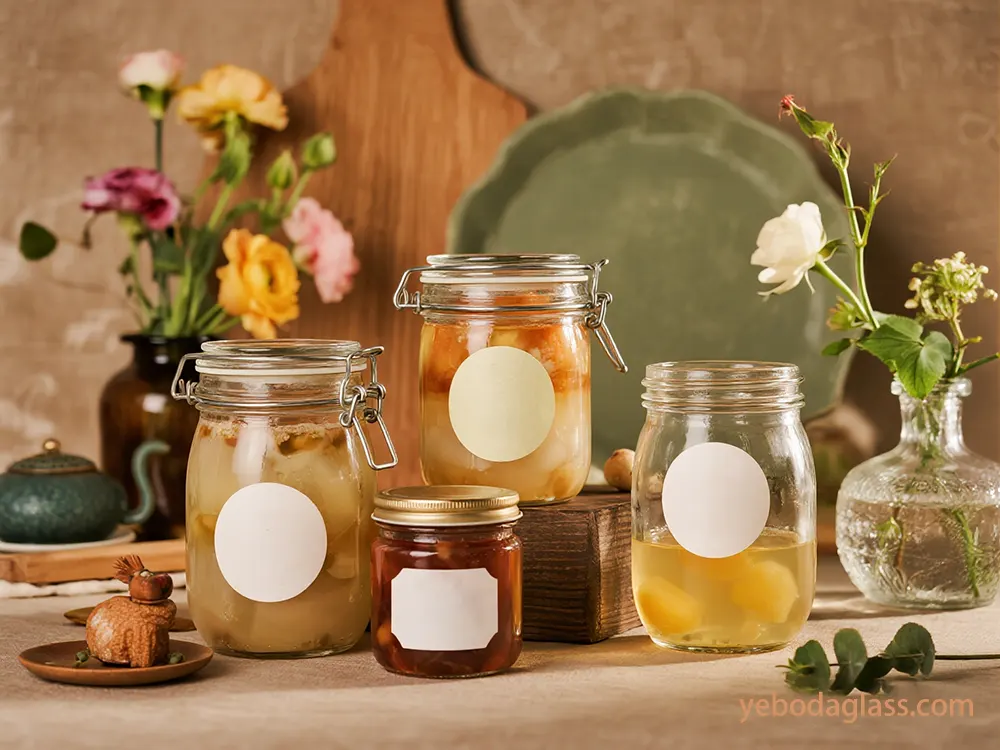
2. Gyártási kapacitás és az ellátási lánc megbízhatósága
A hatékony ellátási lánchoz elengedhetetlen az állandó termelés, a kézben tartott átfutási idők és az erős logisztika. A Yeboda olyan partnereket keres, akik rendelkeznek a jelenlegi kapacitással és a zavarokkal szembeni működési rugalmassággal.
2.1 termelési kapacitás és mennyiséggazdálkodás
A beszállítóknak folyamatos gyártási verziókat és rendelési méreteket kell teljesíteniük, ami megfelelő infrastruktúrát igényel (számos gyártósor, korszerű gépek, hatékony munkaerő). Például elektromos olvasztókemencék, tisztább üveg és alkalmazkodóképes összetételek, amelyek biztosítják a gyakori minőséget. A könnyű súly olyan eljárások révén, mint az NNPB, könnyű üvegeket állít elő az integritás feláldozása nélkül, csökkenti a szállítási költségeket és a környezeti hatásokat. Az ilyen technikák hatékony, folyamatos megoldást kínálnak a beszállítóknak.
2.2 Átfutási idő optimalizálása és globális logisztika
A hatékony átfutási időgazdálkodás, a készletgazdálkodás és a piac fontos az elszámoltathatóság szempontjából, ami kifinomult logisztikai hálózattal és aktív ellátási lánc menedzsmenttel rendelkező beszállítót igényel.
2.2.1 Az ellátási lánc rugalmassága 2025-re
2025-re az üvegből készült anyagok ellátási lánca rugalmasságot, sokkhatásokat, gyors tengelyt és erősödést jelent, nemcsak a túlélés érdekében. Tier, Peer Network és adatalapú irányítópult.
2.2.2 Főbb teljesítménymutatók (KPI-k) és kockázatkezelés
Suppliers will have to track damage rates ( 95%), audit compliance (100%), and return rate (<1%). Regular digital risk audits are required to score suppliers on these matrix, plus regulator and ESG/Sustainability Compliance. Delivery below 95% of the time is a red flag.
2.2.3 Stratégiai források és diverzifikáció
A kockázatok csökkentése érdekében a Yeboda olyan beszállítókra szorul, akik változatos logisztikával és globális gyártási hálózattal rendelkeznek, és számos beszerzési lehetőséget kínálnak a piaci igényekhez és zavarokhoz (geopolitikai helyzet, természeti katasztrófák, hiány) való igazodás érdekében. A szerződések gyors átállást, minimális rendelési mennyiség csökkentését és alternatív útvonaltervezést tesznek lehetővé. Ez tovább növeli a rugalmasságot.
2.2.4 Valós idejű láthatóság és technológiai integráció
A technológia által biztosított valós idejű láthatóság (az óceáni szállítástól a szárazföldi szállításig) fontos az irányítás, az útvonalak adaptálása és a hatékonyság javítása szempontjából. Az IoT-alapú csomagolás és a digitális platformok biztosítják az élő tér, a hőmérséklet és a pozíció monitorozását, biztosítva az átláthatóságot.
2.2.5 csomagolási adaptáció
A csomagolás adaptálása az ellátási láncban maximalizálja a hatékonyságot, a védelmet és a költséghatékonyságot. Ez magában foglalja az elemek kalibrálását, valamint a folyamatok, anyagok és a tervezés fejlesztését. A stratégiák közé tartozik a megfelelő méretezés, az intelligens követési rendszer és az újrafelhasználható csomagolás (ami hatékony fordított logisztikát és nyomon követést igényel). Ezek az erőfeszítések csökkentik a költségeket, növelik a teljesítményt, korszerűsítik a működést és javítják a márkaimázst.
2.3 Műveleti rugalmassági és vészhelyzeti terv
Az ellátási lánc gyengeségei a lánc elején, a szállítás során, az elosztóközpontokban és az üzletekben találhatók. A zavarok késedelmes szállításokat, hihetetlen előrejelzéseket, meghibásodást, károkat, elmaradt szállításokat, magas költségeket, gépleállást, a helyreállítás késedelmét és kiesett értékesítést okoznak. A rugalmas beszállítók erős alkalmi tervekkel rendelkeznek: diverzifikált beszállítói bázissal, pufferkészlettel, alternatív szállítási útvonallal, automatizálással (a munkaerőhiány csökkentése érdekében) és aktív kommunikációval a szállítóval.
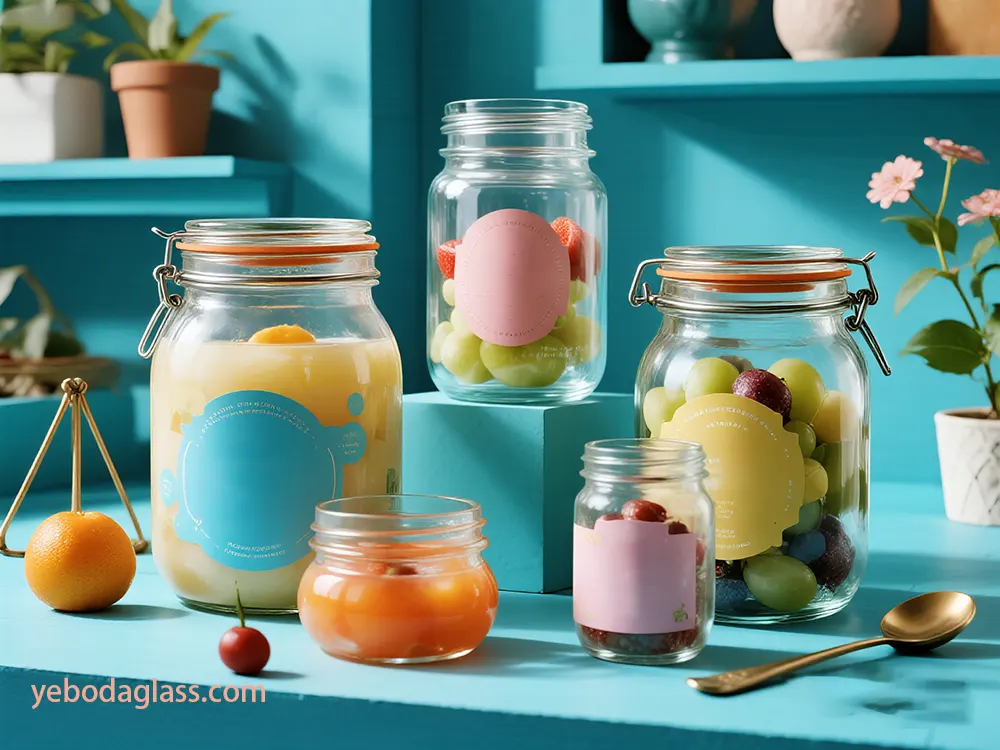
3. Alkalmazkodási, tervezési és innovációs képességek
Az egyedi csomagolás megkülönbözteti a márkákat a zsúfolt piacon. A Yeboda olyan beszállítókat keres, akik tervezési és innovációs partnerek, és a márka vízióját egy konkrét, funkcionális üvegedénybe ültetik át.
3.1 Egyedi üvegkialakítás és adaptációs lehetőségek
Az erős alkalmazkodóképesség változatos lehetőségeket kínál az egyedi márkaidentitás kialakítására.
3.1.1 méret, felület és díszítés
- Egyedi formák és dombornyomás: Alkosson egyedi formákat és márkaidentitást dombornyomott/megvitatható logóval, kínáljon vizuális és tapintási vonzerőt (pl. hatszögletű üveg méhecskével a mézhez).
- Egyedi dizájn: A beszállítók a standard méretnél nagyobb egyedi üvegeket fejlesztenek, amelyek különböző formákkal és színekkel tükrözik a márkaidentitást.
- Színes és jéghideg üveg: A márka esztétikailag másképp néz ki, fokozva a polcok vonzerejét.
- Fejlett technológia: A 3D nyomtatás lehetővé teszi az összetett, egyedi üvegtartályok előállítását komplex formákkal, feszegetve a gyártás határait.
3.1.2 dekorációs technológiák
A modern dekoráció széleskörű márkaépítési lehetőségeket kínál:
- Digitális nyomtatás: Nagy részletességű, teljes gallérra nyomtatott grafika közvetlenül üvegre összetett tervekhez és márkajelzéshez.
- Speciális nyomtatás és címkézés: Sokoldalú felületek különféle technikákhoz, a papírtól a közvetlen digitális nyomtatásig, támogatva az összetett mintákat és az élénk színeket.
- Hőálló nyomtatás: biztosítja, hogy a címkék megmaradjanak a meleg vagy gyümölcstelen termékek esetében.
3.2 Új csomagolási megoldás
Az innováció a szépségen túl a funkcionalitást és a fogyasztói elköteleződést is magában foglalja.
3.2.1 Intelligens csomagolási integráció
Az intelligens technológiai integráció (üvegben vagy kupakban) forradalmasítja a márkaépítést és a fogyasztói elköteleződést.
- QR-kód és NFC-címkék: Termékinformációk, eredeti vagy interaktív élmények (pl. NFC-S) Bőrápolási tippeket tartalmazó tégely).
- Interaktív címke: Az AR címkék okostelefonokon keresztül biztosítanak magával ragadó márkaélményt.
- Hőmérsékletjelzők: A termokromatikus tinták, amelyek tintafunkciókat is biztosítanak, megváltoztatják a színt, hogy az az optimális tálalási/tárolási hőmérsékletet mutassa.
3.2.2 Funkcionális jellemzők és felhasználói élmény
Az innovatív kialakítás fokozza a felhasználói élményt és a termékvédelmet:
- Funkcionális jellemzők: a beszállítók olyan elemeket adnak hozzá, mint a biztonsági zárak, a könnyen szürke fedelek vagy a hátulról használható kialakítás.
- Légmentes szivattyú technológia: Népszerű a bőrápolásban, védi az anyagot a oxidációt és hatékony, hulladékmentes adagolást biztosít.
- Többcélú csomagolás: Az újrafelhasználható üvegek (pl. tárolásra/dekorációra) a környezettudatos fogyasztók számára vonzóak, a termék meghosszabbítja az életciklusát.
3.3 Fenntarthatóság a tervezésben
A fenntarthatóság az üvegcsomagolás innovációjának motorja.
- Újrahasznosított üveg (PCR): A megnövelt PCR-tartalom kulcsfontosságú. A „Wild Glass” 100%-ban újrahasznosított üveget használ, amely a tökéletlenségeket is magában foglalja az autentikus érzet érdekében.
- Környezetbarát anyagok: Az innovációk közé tartoznak a biológiailag lebomló/komposztálható címkék és a tartósságot/esztétikát biztosító nem mérgező bevonatok.
- Megújuló energia: A gyártók nap- és szélenergiát alkalmaznak; az elektromos olvasztókemencék tisztább működést biztosítanak.
- Körforgásos Gazdasági Alapelvek: Az újrahasznosított üveg, a könnyűszerkezetes építés és a környezetbarát anyagok előnyben részesítése összhangban van a körforgásos gazdaság céljaival, csökkentve a kibocsátásokat és az üzemanyag-fogyasztást. A YEBODA számára az innovatív beszállítókkal való partnerség javítja a márka történetmesélését, a láthatóságot és az ügyfélélményt, növelve az érzékelt értéket.

4. Költség-hatás és összérték-ajánlat
Míg az egységár számít, a stratégiai üvegbefőttesüveg-beszerzés a teljes költség-tulajdonlást (TCO) értékeli. Ez az átfogó megközelítés figyelembe veszi a vételárat, a minőség stabilitását, a szolgáltatási szintet és a hosszú távú költségeket.
4.1 A vételáron túl: Teljes tulajdoni költség (TCO) – megtekintések
A stratégiai beszállítói értékelés a beszerzési áron túl, a minőségen és a hosszú távú költségeken is túlmutat a jobb beszerzés érdekében. 16. Az értékesítésből származó megnövekedett beszerzési részesedés rávilágít a hatékony beszerzés fontosságára. A vállalat sikere szempontjából alapvető fontosságú az eredeti teljesítmény, ezért fontos az értékelés és a kiválasztás.
4.1.1 Stabilitás a tervezésben
A fenntarthatóság az üvegcsomagolás innovációjának motorja.
- Újrahasznosított üveg (PCR): Fontos a PCR-tartalom növelése. A „Wild Glass” 100%-ban újrahasznosított üveget használ, a hibákat is figyelembe véve, hogy autentikus élményt nyújtson.
- Környezetbarát anyagok: Az innovációk közé tartoznak a biológiailag lebomló/komposztálható címkék és a tartósságot/esztétikát biztosító, nem parivor bevonatok.
- Megújuló energia: A gyártók nap- és szélenergiát alkalmaznak; az elektromos olvasztókemencék tisztább működést biztosítanak.
- Körforgásos gazdaság elmélete: Az üveg, a könnyű és környezetbarát anyagok újrahasznosítása, összhangban a körforgásos gazdaság céljaival, csökkenti a kibocsátásokat és az üzemanyag-fogyasztást. A Yeboda számára az innovatív beszállítókkal való partnerség növeli a márkatörténetet, a láthatóságot és az ügyfélélményt, valamint elősegíti az érzékelt értéket.
4.2 Beszállítói értékelési struktúra
A Yeboda objektív beszállítói strukturált struktúrákat használhatnak az értékeléshez. A kiválasztási folyamat magában foglalja a kritériumokat, a TCO-elemzést és a végső kiválasztás meghatározását. Az AHP objektíven tudja értékelni a beszállítókat. A TCO-modellt (dollár- vagy értékalapú) használják a kiválasztáshoz és a folyamatos értékeléshez.
4.3 Versenyképes árképzés és mennyiségi kedvezmények
Míg a teljes birtoklási költség (TCO) összességében számít, a versenyképes árak és a mennyiségi kedvezmények továbbra is fontosak. A beszállítóknak átlátható árakat kell kínálniuk, amelyek tükrözik a piaci feltételeket és a mennyiségi előnyöket. A kedvezményt azonban mérlegelni kell a teljes birtoklási költség rejtett költségeivel szemben. A Yebodának a teljes érték érdekében kell együttműködnie, csökkentve a hosszú távú kiadásokat és kockázatokat, nem csak a legalacsonyabb egységértéket.

